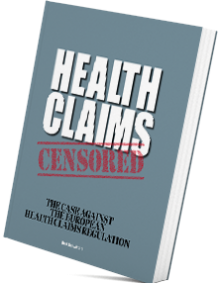26 September 2013
In the US, the never ending and vehement health claims battle between POM Wonderful and the American Federal Trade Commission (FTC) rages on without any of the parties giving in. In August, the petitioners, gathered under the title “POM Wonderful, LLC ET AL” [1], filed briefs in which they argued that “competent and reliable scientific evidence” should be the standard for determining “the appropriate level of substantiation required to justify” the health claims made by POM for its pomegrenate juice. POM also argued that thehealth claims made for pomegrenate juice, because it is a concededly-safe food product, should be held to a more flexible substantiation standard than the one for potentially toxic pharmaceutical drugs.
POM seeks to convince the Court of Appeals for the District of Columbia Circuit that the FTC “failed to prove that Randomized Controlled Trials (RCTs) are in fact necessary to substantiate the health claims it [FTC] believed were implied in POM’s advertisements.” According to POM, the standard that must be applied is that of “competent and reliable scientific evidence,” a standard that the FTC itself had defined as “tests, analyses, research, studies, or other evidence based on the expertise of professionals in the relevant area, that [have] been conducted and evaluated in an objective manner … using procedures generally accepted in the profession to yield accurate and reliable results.”
According to the FTC, that standard must now include at least 2 RCTs for it to be considered accurate and reliable. Professionals relying on other-than-RCT research methods – such as doctors and therapists who observe in practice that certain products produce beneficial effects in their patients – are no longer qualified to render credible testimony.
This battle does not take place within the legal context of consumer protection, but of the First Amendment to the American Constitution. The First Amendment constitutes and affirms that “[c]ongress shall make no law respecting an establishment of religion, or prohibiting the free exercise thereof; or abridging the freedom of speech, or of the press; or the right of the people peaceably to assemble, and to petition the government for a redress of grievances.”
However, abridgement of the freedom of speech is permitted when speech that forms part of commercial communication is found to be misleading. Misleading commercial speech is not protected against government interference. For this reason, the FTC argued in the POM case: “Once the Commission has determined that [the] ads are actually misleading, no further analysis is necessary because misleading commercial speech is not protected by the First Amendment.”
To the extent that the ads were not actually misleading, because they truthfully presented competent and reliable scientific evicence, the Commission appeared to take the fallback position that disease claims not supported by RCTs are inherently misleading, and therefore also not subject to First Amendment protection. In the view of the FTC, the First Amendment should be read as meaning: “congress shall make no law to abridge the freedom of speech that is based on at least 2 RCTs.”
The European version of the “First Amendment” can be found in Article 10 of the Council of Europe’s Convention for the Protection of Human Rights and Fundamental Freedoms as the fundamental freedom “to hold opinions and to receive and impart information and ideas without interference by public authority and regardless of frontiers.” In Article 10(2), the authors of the EU Convention seriously restricted this freedom by stipulating that it “may be subject to such formalities, conditions, restrictions or penalties as are prescribed by law and are necessary in a democratic society, in the interests of national security, territorial integrity or public safety, for the prevention of disorder or crime, for the protection of health or morals, for the protection of the reputation or rights of others, for preventing the disclosure of information received in confidence, or for maintaining the authority and impartiality of the judiciary.”
The difference between the US and the EU is that America’s First Amendment says that Congress shall make no laws to abridge the freedom of speech and that the EU Convention subjects the Freedom of Expression to the laws prescribed by “Public Authority” on the basis of “what is necessary” in practically all fields of life. In the EU, the Nutrition and Health Claims Regulation (NHCR) constitutes a serious prohibition of the freedom of speech “prescribed by law.” The NHCR is a totalitarian abridgement of the fundamental freedom of speech, because what may be said depends completely and exclusively on interference by public authority.
The NHCR is a legal instrument that abridges the freedom of expression on grounds of the expression’s presumed misleadingness. This places the NHCR squarely in the field of consumer protection. In numerous consumer protection cases, the European Court of Justice (ECJ) has repeatedly held that the benchmark for testing the misleadingless of information shall be the average consumer. In one of its landmark decisions [2], the ECJ held that national courts, when distinguishing misleading from truthful information, “must take into account the presumed expectations which it [the information] evokes in an average consumer who is reasonably well-informed and reasonably observant and circumspect.” (emphasis added) When a court encounters difficulties in applying this standard, it “may have recourse, […], to a consumer research poll or an expert’s report as guidance for its judgment.”
In Recital 16 of the NHCR, the European legislature explains that “[i]t is important that claims on foods can be understood by the consumer and it is appropriate to protect all consumers from misleading claims.” The legislature then refers to ECJ case law by stating: “However, […], the Court of Justice of the European Communities has found it necessary in adjudicating on advertising cases to examine the effect on a notional, typical consumer. In line with the principle of proportionality, and to enable the effective application of the protective measures contained in it, this Regulation takes as a benchmark the average consumer, who is reasonably well-informed and reasonably observant and circumspect, taking into account social, cultural and linguistic factors, as interpreted by the Court of Justice, […].” (emphasis added)
Per Recital 16, the 2 criteria for the inclusion of health claims in the Lists of the Union Register of Authorized Health Claims shall be understandability and non-misleadingness. In both cases the average recipient of health claims shall be taken as a benchmark. The problem is, that in the process of authorizing or rejecting health claims, not one single claim has been tested for misleadingness by a panel of averageconsumers. No claim was tested in a consumer research poll or by experts taking the presumed expectations of theaverage recipient of health claims as the benchmark. In all the Articles of the NHCR, the EU legislature completely ignored what it promised in Recital 16 and, in doing so, paid disrespect to what the Court of Justice “found necessary in adjudicating on advertising cases.”
The reasonably well-informed and reasonably observant and circumspect consumer does not play any role whatsoever in examining the effects that health claims have on them and what expectations these claims evoke in them. This is because, in Recital 17 of the NHCR, the legislature substituted scientific substantiation for the averageconsumer. “Scientific substantiation,” says the EU, “should be the main aspect to be taken into account for the use of nutrition and health claims and the food business operators using claims should justify them. A claim should be scientifically substantiated by taking into account the totality of the available scientific data, and by weighing the evidence.”
In Recital 23, we read that “[h]ealth claims should only be authorised for use in the Community after a scientific assessment of the highest possible standard” and that in order to ensure harmonised scientific assessment of these claims, “the European Food Safety Authority should carry out such assessments.” In carrying out this assignment, the Authority then determined that the appropriate level of substantiation required to justify a health claim shall be substantiation provided by … RCTs. Exit average consumer.
Many will argue that the average consumer is not qualified to evaluate scientific evidence. Well, if the Union legislature would have been of the opinion that the Court of Justice was wrong and that the examination of health claims by well-informed and reasonably observant and circumspect consumers is a disproportionate benchmark for the NHCR and that it would have disabled its effective application, it should have openly and unequivocally said so in Recital 16 of the NHCR. It didn’t. It professed that it would take as a benchmark for the NHCR the presumed expectations of theaverage consumer.
From the perspective of the freedom of speech as it is laid down in the EU Convention of Human Rights and Fundamental Freedoms, the NHCR abridges this fundamental freedom inasmuch as the speech (health claim) is incomprehensible or misleading. The Court of Justice has determined that the perception of the average recipient of the imparted information shall be the benchmark for distinguishing misleading from truthful information. The Court has never adjudicated on the aspect of incomprehensibility in advertising cases.
In any case, combining EU case law and the Human Rights Convention, the average recipient of information determines where the abridgement of the freedom to impart and receive information shall enter into force. However, the European Union has determined that it, the Union, not the European Court of Justice and not the average consumer, shall set the terms of reference for the abridgement of this fundamental freedom: RCTs.
Bert Schwitters
[1] USCA Case #13-1060; Documents #1452070 filed 08/16/2013 and # 1451714 filed 08/14/2013; United States Court of Appeals for the District of Columbia Circuit.
[2] JUDGMENT OF THE COURT (Fifth Chamber) of 16 July 1998 in Case C-210/96 re the case between Gut Springenheide GmbH, Rudolf Tusky and Oberkreisdirektor des Kreises Steinfurt – Amt für Lebensmittelüberwachung.




